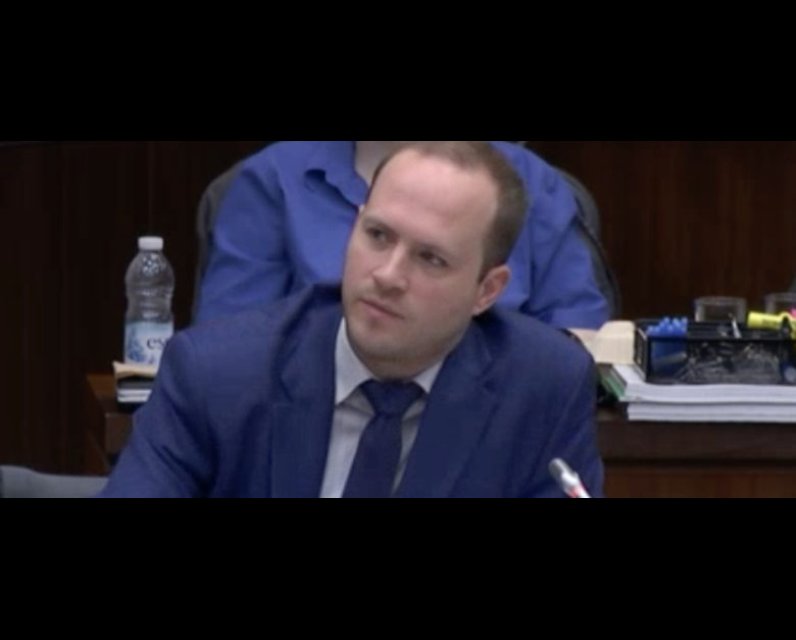Unpublished Opinions
Stefan Klietsch grew up in the Ottawa Valley outside the town of Renfrew. He later studied Political Science at the University of Ottawa, with a Minor in Religious Studies. He ran as a candidate for Member of Parliament for Renfrew-Nipissing-Pembroke three times from 2015 to 2021. He recently graduated with a Master of Arts in Political Science at the University of Carleton.
Nathaniel Erskine-Smith would make for an excellent Leader of the Ontario Liberal Party

Nathaniel Erskine-Smith is well-known for his committee work and efforts to treat politics with a mature tone. Photo taken from michaelgeist.ca.
The available slate of leadership candidates
The pivotal deadline for new members to be eligible to join the Liberal Party of Ontario Leadership Contest is fast-approaching: September 11th at 6pm. As such, immediate scrutiny of the 5 expected Leadership contestants is warranted: Yasir Naqvi, Nathaniel-Erskine Smith, Bonnie Crombie, Adil Shamji, and Bonnie Crombie.
Having now had at least some minimal face-to-face interaction with each of the candidates, I would credit the Ontario Liberal Party for fielding a positive group of mutually respectful high-caliber citizens for one of Ontario’s top jobs. I would not, however, credit the party for running a truly diverse slate of candidates. As every single contestant at the time of writing is an elected MP, MPP, or Mayor, there is not a single candidate in the running who is not currently already making a viable income from pre-existing political work, which could not be said of the prior leadership contest in 2020. Never-mind even having candidates with major divergences in policy preferences. And despite the irony of my not endorsing the female candidate, I will still acknowledge the inequitable gender representation within the race. These facts put into question how representative this sample of candidates is of Ontario’s political class, let alone of the general population of Ontario.
Nonetheless, the candidates on offer do bring different experiences and personalities to the table. I have made a modest effort to carefully consider the merits of each of the candidates on offer, and I encourage members to attempt to keep their own minds open to change. But, based on the current evidence at hand, arguably the candidate easiest to argue has the most merit is Nathaniel-Erskine Smith.
Outsider versus insider political leadership
This endorsement does come with a caveat. I have written previously how it is desirable for a potential party Leader to have longstanding experience with the party that they attempt to lead, and that they have experience with the legislature in which they intend to lead a caucus, Queen’s Park in this case. (Though these experiences can be difficult for any one person to combine, which was why I had submitted an unsuccessful constitutional amendment to the party to split the Leader’s Office into an Electoral Leader and a Legislative Leader.) Nate has never even run a candidacy for Queen’s Park and lacks any history of a notable senior role within the OLP. Though he is apparently, at least, the only candidate to date who has humbly put forth a constitutional amendment putting restraints upon the would-be Leader, successfully passing his amendment to force the Leader into annual meetings with the party’s Provincial Liberal Associations. (Though I immodestly consider this amendment to be a weak form of accountability compared to the multiple amendments that I myself put forward.)
Despite the above observation, Nate is arguably the kind of Leader that the OLP needs, and maybe because of and not despite his lack of obvious insider status. The OLP has faced two disappointing election results in a row that can be easily accounted for in terms of the failure of the party to listen to its members and to be in touch with the interests of most Ontarians. Resolving this dilemma requires a Leader with strong listening skills, something that Nate has shown throughout his political career. (On that note, regardless of the Leader the party chooses, the OLP will likely remain out-of-touch with Ontarians if it continues its decade-long streak of never hosting a policy convention.)
For the candidates with the longest insider-status to the party, Yasir Naqvi especially, an obvious question is to be posed: where were you when the party consistently failed to host policy conventions and otherwise made the listening mistakes that it did in the 2018 and 2022 elections? Did you have ideas for doing things differently that were ignored by the then leadership? If so, what were those ideas? If not, what mistakes did you personally make? For the candidates with the greater outsider-status within the party, like Nate and Crombie, the answer is simple if uninspiring: I was not there at the decision table.
History of more intellectual-minded leadership
While I have never met any of the Leadership Contestants before this year and thus have not known any of them for a long time, I have long followed Nate’s career with interest. Our federal and provincial parliamentary institutions have been over-represented with yes-men and while Nate has not shown as much independence on party votes as would be ideal for a strong representative, he certainly has stretched the limits by Canadian standards. Sometimes, he has defied the leadership line for the sake of the party, such as when he dissented from fellow Liberals on his Committee to vote for further questioning of the Integrity Commissioner and to further challenge him on a flawed ruling. A more well-known example of Nate voting on principle was his being one of only two Liberal MPs to support Committee recommendations on electoral reform. Had Nate shown more independence than he has to date, he might well have shared the same fate as Judy Wilson-Raybould and Jane Philpott. Instead, he has been endorsed by many of his colleagues in the federal caucus (not that other candidates are necessarily lacking for endorsements).
There is evidence beyond Nate’s voting record to imply that he understands how a Leader should function. In his work as a Member of Parliament, he has interviewed various stakeholders and public figures in his “Uncommons” podcast series to consider their political perspectives — this is exactly the kind of work that a Leader should be doing. By contrast, Yasir Naqvi has described how he aspires to use the role of Leader for the sake of “public service” — this is arguably a misunderstanding of what the fundamental role of the Leader should be. We have not seen Nate explicitly repudiate this kind of job descriptor, but we have seen him treat politics as a more intellectual line of work, as it should be treated.
The most significant work of parliamentary representatives and even in government executives is fundamentally a question of objective and careful policy consideration. Promoting and passing representative and effective policies is what makes the difference between a party in touch with public opinion and a party out-of-touch with public opinion. Being a well-intentioned or even humble community leader as implied with a term like “public servant” is not enough for thriving in such a role.
Concluding Argument
In conclusion, based on currently available evidence Nathaniel Erskine-Smith is arguably the most merited candidate for Ontario Liberal Leader, both for his attempts to make politics into a more intellectual endeavour and for the tolerance that we can infer that he would present towards members who would dissent against his own leadership. However, none of my arguments should be interpreted as reason for members and observers among the general public to necessarily overlook the coming leadership debates throughout the fall. Furthermore, this blog would be at risk of being one-sided if I did not offer at least one compliment for each of the other candidates on offer, so I will do so now:
· Yasir Naqvi: He is clearly the candidate on offer with the most history in and understanding of politics at Queen’s Park.
· Ted Hsu: I have verified from personal experience that he is indeed a “nice guy” and arguably a good listener in his own right. He once patiently heard me out as I spoke for a couple of minutes presenting my dual-leadership proposal to him.
· Adil Shamji: I suspect that he is one of the more down-to-earth candidates, as I know that he has shared around his personal email address with members. He also apparently sacrificed a higher income as a physician to become a Member of Provincial Parliament.
· Bonnie Crombie: She might be the candidate who best understands the need for the OLP to meaningfully distinguish itself in policy terms from the NDP.
Despite the above title of this piece, the membership’s choice between these candidates for Leader will be less consequential than whether the OLP has policy conventions before the next election. The listening skills of the next OLP Leader will only help the party so much if diverse perspectives are never given a platform by the party to be heard — and I will not bet on the OLP succeeding without one.



Comments
Be the first to comment